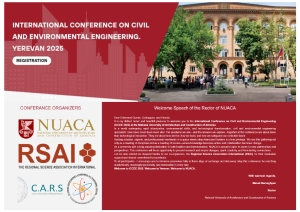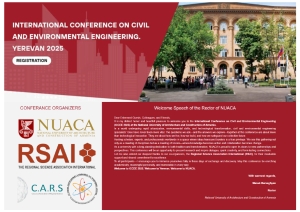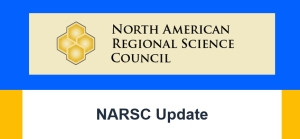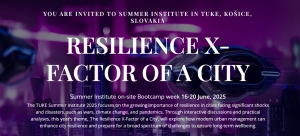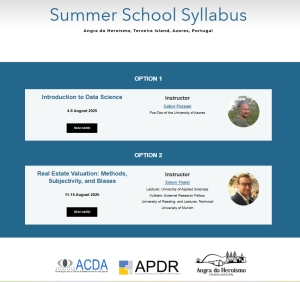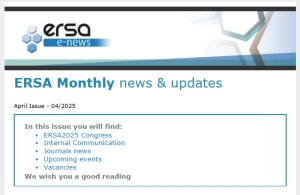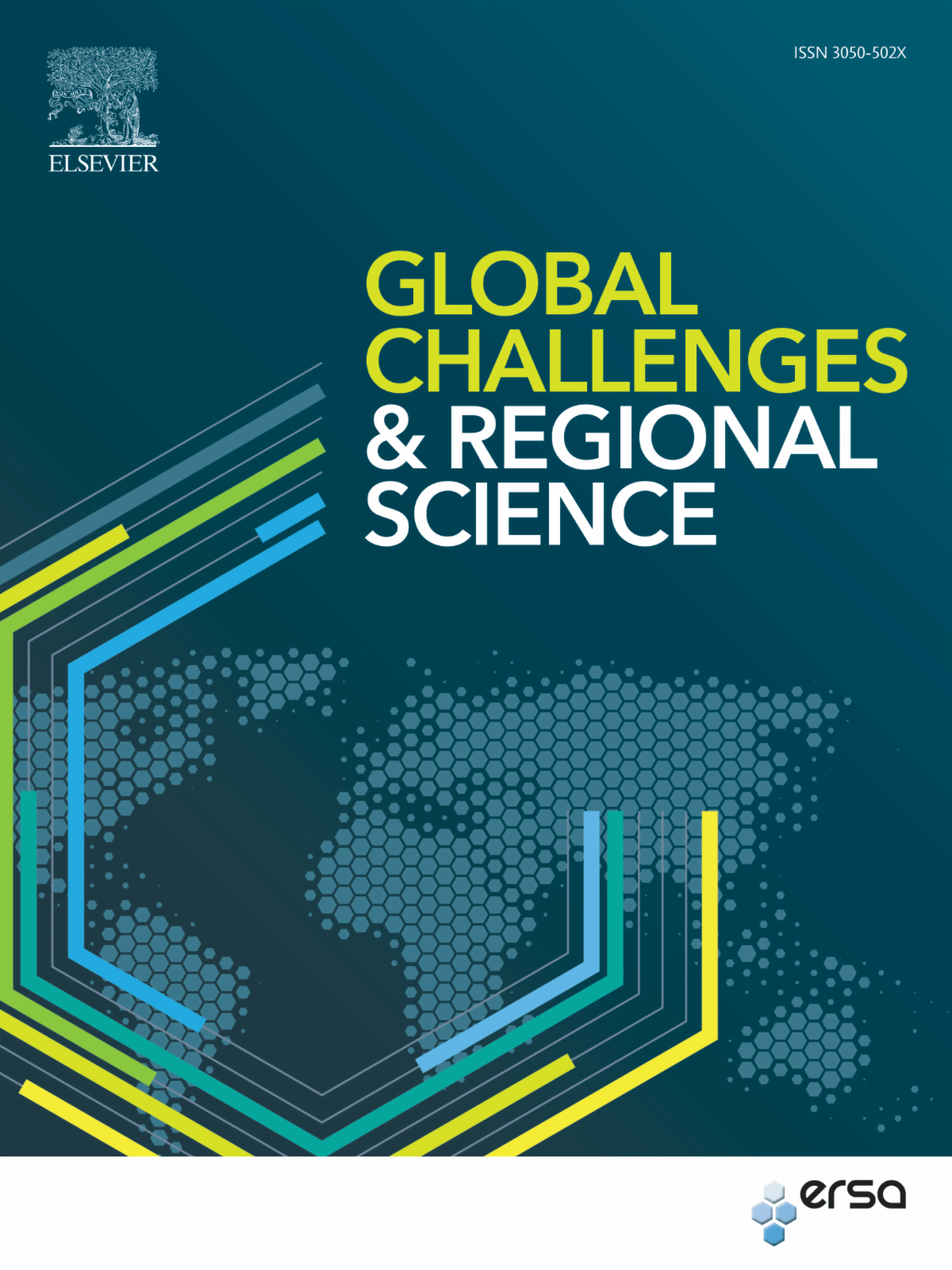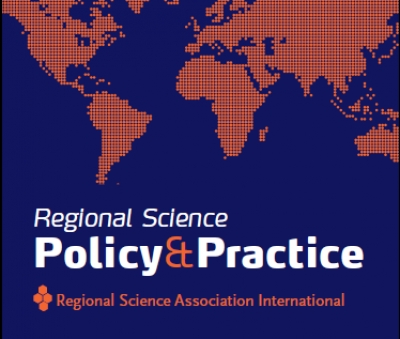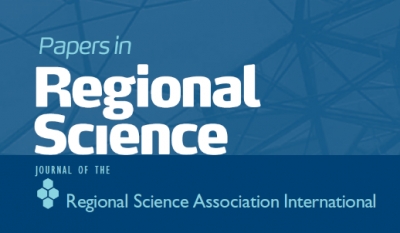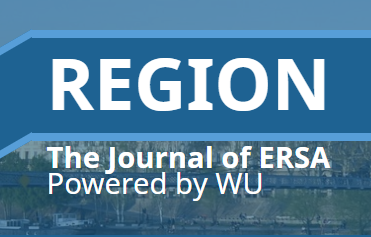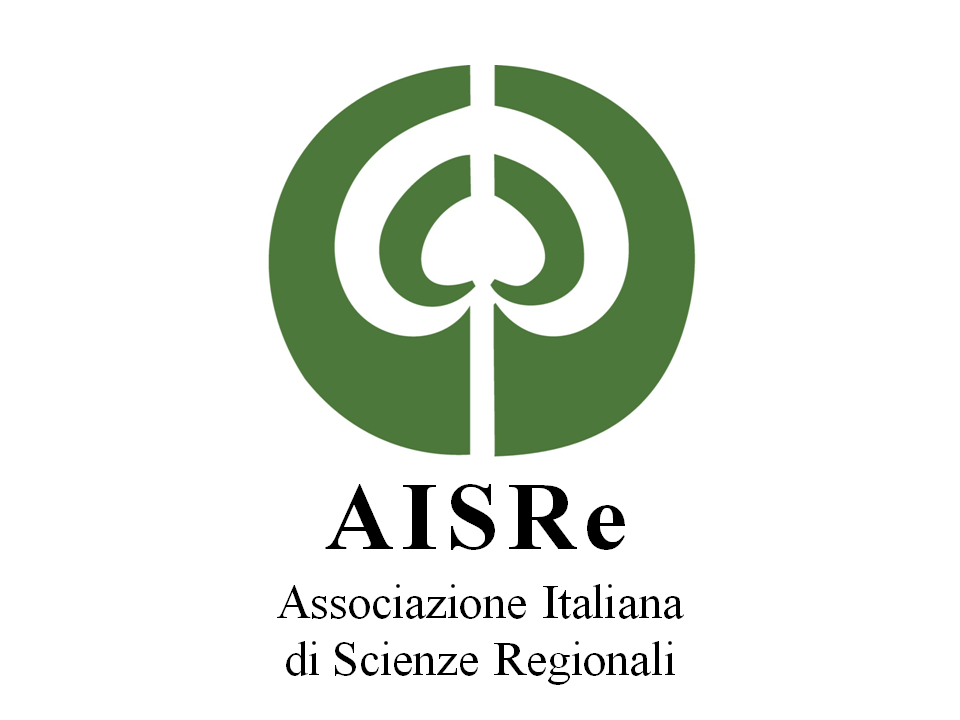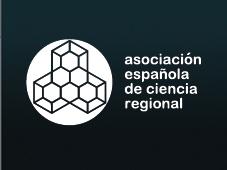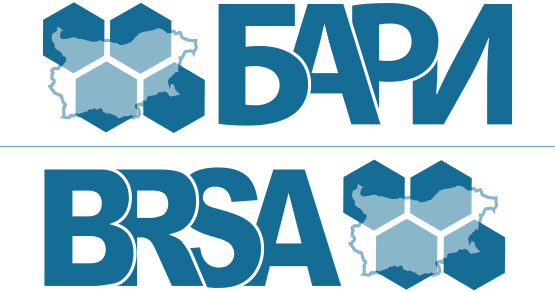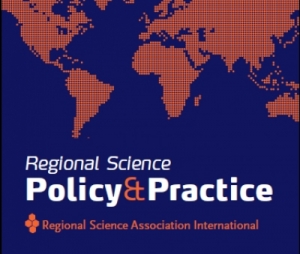Membership Information
Elisabete Martins
New elected RSAI Fellow for 2025
The RSAI President, Prof Shibusawa and the RSAI Executive Director, Ana Vinuela, have the pleasure to announce the new elected RSAI Fellow for 2025.
But first, we would like to thank the members of the RSAI Fellows Selection Committee -made up of Prof. Genevieve Giuliano (chair), Jouke Van Dijk and Amit Batabyal-, who received and evaluated the candidatures for this year's RSAI Fellows election; and also thank all the RSAI Fellows that participated in the ballot.
According to the votes received from the RSAI Fellows, four (4) new Fellows have been elected this year 2025 (ordered in alphabetical order):
- Daniela -Luminita Constantin (Bucharest University of Economic Studies, Romania)
- Sarah Low (University of Illinois Urbana-Champaign, USA)
- Daoqin Tong (School of Geographical Sciences and Urban Planning at Arizona State University, USA)
- Hans Westlund (KTH Royal Institute of Technology, Stockholm; Jönköping International Business School, Jönköping, Sweden)
Congratulations to all for this outstanding achievement!
12 PhD positions: Regional Science & Economic Geography, GSSI, Italy
The Gran Sasso Science Institute, a public, research-intensive university dedicated to doctoral education in L’Aquila, Italy, has advertised 12 fully funded doctoral positions in its 4-year English-taught PhD programme in Regional Science & Economic Geography. The programme offers training in both quantitative and qualitative research methods in economic geography and regional studies.
Deadline: 23 May, 2025
L’Aquila is a mid-size historical town in central Italy, surrounded by mountains in a largely unspoiled natural environment. It is the capital city of the Abruzzo region. Rome can be reached from L’Aquila in about one hour and half by bus.
Here is the programme’s official statement:
The Ph.D. program in “Regional Science and Economic Geography” is a cutting-edge and interdisciplinary program designed to explore the intricate relationship between space and socioeconomic phenomena, by employing mixed methods and interdisciplinary approaches. This Ph.D. program equips students with the skills to offer evidence-based policy recommendations, rooted in robust empirical findings and established causal relationships, and fosters research in economic and/or human geography. It aims to address the challenges posed by globalization, urbanization, climate change, and development by fostering a deeper understanding of these processes. We welcome students with different backgrounds, including (but not limited to) applied economics, economic and/or human geography, or sociology, who share an interest in these issues.
The PhD Programme lasts four years. The Academic Year will start on November 1st, 2025. The GSSI awards scholarships until the thesis dissertation and for a maximum of four years. The yearly gross amount of the scholarship is € 16.243,00. An additional 50% on a monthly basis can be awarded for research periods abroad if approved by the GSSI. During their first year, PhD students will be offered free accomodation by the GSSI. In the remaining three years they will receive from the university a contribution to their housing costs.
PhD students will participate in the department’s interdisciplinary research tracks along with faculty members.
All details related to this call can be found here.
* Students with interests in critical and heterodox regional studies and economic geographies are encouraged to apply *
Armenian section | Workshop “Smart and Sustainable Cities/Urban Planning”, International Conference on Civil and Environmental Engineering (ICCEE 2025), October 24–26, 2025, NUACA, Yerevan, Armenia
Workshop “Smart and Sustainable Cities/Urban Planning”. International Conference on Civil and Environmental Engineering. organized in partnership with National University of Architecture and Construction of Armenia.
RSAI members are interested just in that workshop (within a larger conference on Engineering).
RSAI just funded the workshop on Smart and Sustainable Cities/Urban Planning under the RSAI Program Naturing Talent.
The International Conference on Civil and Environmental Engineering (ICCEE 2025) will be held on October 24–26, 2025, at the National University of Architecture and Construction of Armenia (NUACA) in Yerevan. This conference aims to bring together leading academics, researchers, engineers, and industry professionals from around the world to share knowledge, exchange ideas, and explore cutting-edge advances in civil and environmental engineering.
Hosted by NUACA and co-organized in partnership with the Regional Science Association International (RSAI), the conference will serve as a vibrant platform to foster interdisciplinary collaboration, inspire innovative thinking, and promote sustainable development strategies for the built environment.
This conference offers a unique opportunity to explore innovative solutions to contemporary challenges and to contribute to shaping the future of resilient, sustainable, and intelligent urban environments. We warmly welcome your participation and look forward to fruitful scientific exchange in the inspiring setting of Armenia.
The thematic scope of the ICCEE 2025 includes a wide range of pressing and emerging topics in the field, organized in the following focus areas:
Further details on the conference subtopics can be found at the following link
More info at: https://iccee.nuaca.am/
Armenian section | Workshop “Smart and Sustainable Cities/Urban Planning”, International Conference on Civil and Environmental Engineering (ICCEE 2025), October 24–26, 2025, NUACA, Yerevan, Armenia
Workshop “Smart and Sustainable Cities/Urban Planning”. International Conference on Civil and Environmental Engineering. organized in partnership with National University of Architecture and Construction of Armenia.
RSAI members are interested just in that workshop (within a larger conference on Engineering).
RSAI just funded the workshop on Smart and Sustainable Cities/Urban Planning under the RSAI Program Naturing Talent.
The International Conference on Civil and Environmental Engineering (ICCEE 2025) will be held on October 24–26, 2025, at the National University of Architecture and Construction of Armenia (NUACA) in Yerevan. This conference aims to bring together leading academics, researchers, engineers, and industry professionals from around the world to share knowledge, exchange ideas, and explore cutting-edge advances in civil and environmental engineering.
Hosted by NUACA and co-organized in partnership with the Regional Science Association International (RSAI), the conference will serve as a vibrant platform to foster interdisciplinary collaboration, inspire innovative thinking, and promote sustainable development strategies for the built environment.
This conference offers a unique opportunity to explore innovative solutions to contemporary challenges and to contribute to shaping the future of resilient, sustainable, and intelligent urban environments. We warmly welcome your participation and look forward to fruitful scientific exchange in the inspiring setting of Armenia.
The thematic scope of the ICCEE 2025 includes a wide range of pressing and emerging topics in the field, organized in the following focus areas:
Further details on the conference subtopics can be found at the following link
More info at: https://iccee.nuaca.am/
NARSC Update | Stevens Award Winner | NARSC at ASSA/AEA Meetings
|
Summer Institute 2025, Resilience X-Factor of a City, 16-20 June 2025, Košice, Slovakia
Summer Institute 2025
Resilience X-Factor of a City
16-20 June 2025, Košice, Slovakia
Registration deadline for PhD student: 15 April 2025.
Contact This email address is being protected from spambots. You need JavaScript enabled to view it.
The Summer Institute will be held in Košice, Slovakia, from June 16 to June 20, 2025, and will bring together early-stage researchers and scholars interested in urban and regional science and related fields.
The Summer Institute 2025 focuses on understanding and strengthening urban resilience by addressing shocks, assessing impacts, fostering adaptation, enabling mitigation, and driving improvement. As our world becomes increasingly complex, cities must evolve, adapt, and bounce back stronger from challenges – whether environmental, social, or economic.
Participants will gain insights into mitigating risks, responding to diverse shocks, and rebuilding cities as resilient, modern, and sustainable urban hubs. By exploring the invisible strength of urban spaces, participants will develop a better understanding of what makes cities resilient in the face of uncertainty and how adaptation and proactive reaction can minimize negative impacts.
The outcomes of the Summer Institute 2025 will also be used as a science-based input for the global COP30 Climate Conference in Belem, Brasil.
Invited speakers and experts
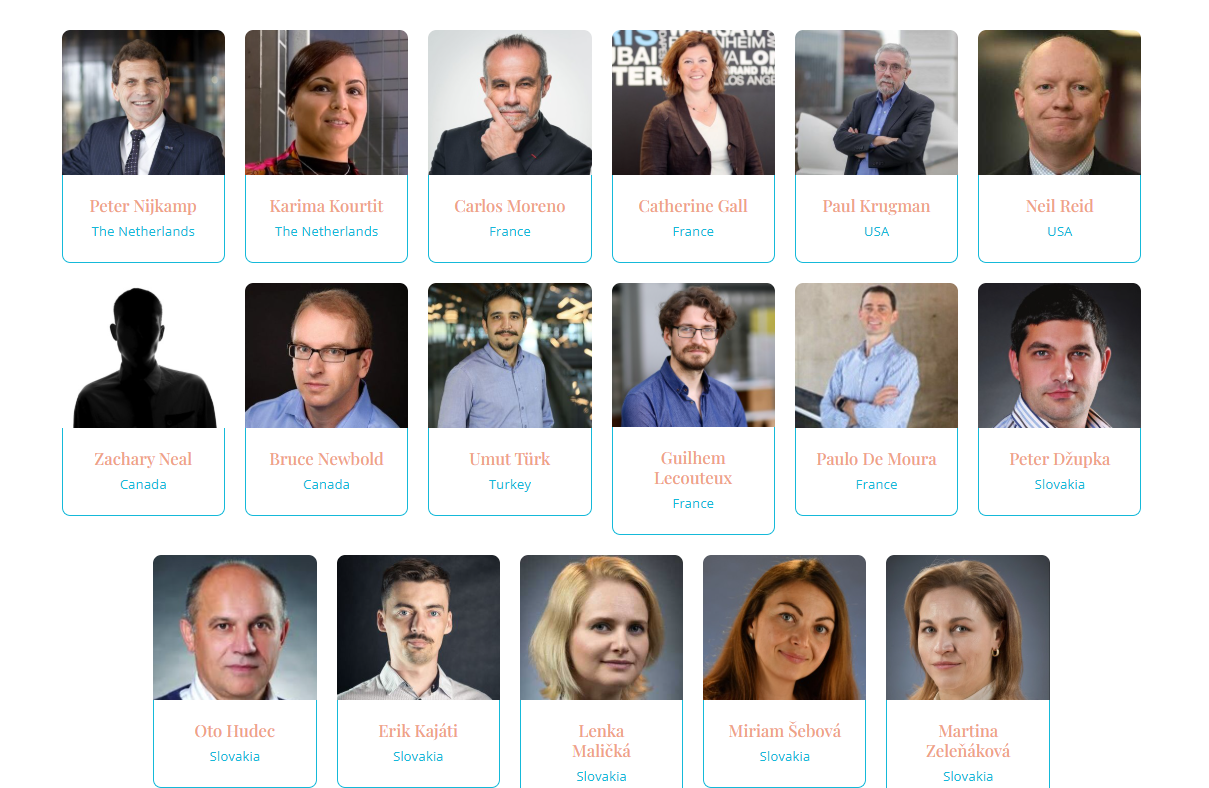
How to apply
Participants should be Master/PhD students or young scientists in the fields of study such as Economics, Regional Science, Architecture, Urban studies, Geography. Participants should be fluent in English (minimum level B2) and eager to work in teams and enthusiasts for solving actual city problems
Ulysseus partner and university students:
Participants should apply for BIP call and have an Erasmus+ STBM Grant (Short Term Blended Mobility) from their Ulysseus home university. The organizers ensure reasonable accommodation options for all participants.
Self-funded participation :
To apply, submit your CV and thesis proposal to This email address is being protected from spambots. You need JavaScript enabled to view it.
Further details are available on our website: https://summerinstitute.tuke.sk/
Portuguese Section | Call for Applications | Two Summer School Syllabus, 4-8 August 2025 and 11-15 August 2025 at Angra do Heroísmo, Terceira Island, Azores, Portugal
Call for Applications
Two Summer School Syllabus
4-8 August 2025 and 11-15 August 2025
Angra do Heroísmo, Terceira Island, Azores, Portugal
Option 1
Introduction to Data Science4-8 August 2025
|
Option 2
Real Estate Valuation: Methods, Subjectivity, and Biases11-15 August 2025
|
Instructor
Simon Thaler Lecturer, University of Applied Sciences Kufstein; External Research Fellow, University of Reading; and Lecturer, Technical University of Munich |
Applications
Application submission
Participants who want to participate in a specific course should submit their application via email (This email address is being protected from spambots. You need JavaScript enabled to view it.) by 15 June 2025 (midnight CET) indicating the name of the course and include (in PDF format):
- A one-page Motivation letter;
- A one-page CV of the applicant.
ERSA Monthly E-news - April 2025
|
|
|
|
|
|
|
|
|
|
|
|
|
|
|
|
|
|
|
|
|
|
|
|
|
|
|
|
|
|
|
|
|
|
|
|
|
|
|
Call for Papers | RSPP Special Issue: Remote Working as a Driver for Rural Transformation?

Call for Papers for Special Issue in Regional Science Policy & Practice (RSPP)
Title: "Remote Working as a Driver for Rural Transformation?"
Guest Editors: Nino Javakhishvili-Larsen & Hans Westlund
The interplay between digitalization, remote work, and counterurbanization is reshaping population distribution and regional development in the 21st century. This special issue explores how the rise of remote work, facilitated by digital technologies, acts as a catalyst for transformative change in rural areas by enabling migration from urban centers and influencing the spatial reorganization of human capital.
Counterurbanization, a key concept in this context, refers to the migration of populations from urban to rural areas (Berry, 1976). Initially observed in the 1970s, this trend has recently regained momentum, driven in part by the rise of remote work—the ability to work outside traditional office spaces using information and communication technologies (ICT). These shifts have reshaped the "post-rural" discourse by blurring the conventional urban-rural divide (Westlund & Borseková, 2025). The emergence of city-regions, which integrate nearby small towns, rural areas, and natural landscapes while more peripheral rural areas and smaller cities decline, exemplifies this transformation. Essentially, "post-rurality" reflects the fundamental redefinition of rural characteristics and functions within an increasingly urbanized and interconnected world (Westlund & Borseková, 2025). The COVID-19 pandemic served as an accelerator, compelling many organizations to embrace remote work, which normalized this practice and broadened its appeal (Eliasson et al. 2025). As a result, many people have reevaluated their living situations, considering rural areas as viable alternatives to densely populated urban centers.
The implications of remote work extend beyond simple population shifts. They are also reshaping migration patterns, with individuals less bound by the geographical constraints of their jobs, when presence on the workplace can be reduced by several days a week. This freedom leads to a renewed interest in rural living, often motivated by lifestyle factors such as proximity to nature, a desire for a slower pace of life, and larger homes (Andersen et al. 2022; Thulin 2023; Haandrikman et al. 2024). Many rural areas, once seen as economically stagnant, are now attracting new residents, including those with valuable human capital attributes (Javakhishvili-Larsen and Andersen 2025a; 2025b).
This shift towards a more distributed workforce presents both opportunities and challenges:
Opportunities: Digitalization enables rural communities to overcome traditional economic limitations by attracting skilled remote workers. The increased availability of remote work promotes the redistribution of human capital across regions, which might promote entrepreneurship and innovation in previously stagnating regions. Coworking in joint workplaces can prevent remote workers from social isolation.
Challenges: These include the revision of rural policies to address the evolving patterns of rural economies and demographics, as well as improvements in internet infrastructure, employers’ willingness and capacity to manage remote work, policy adaptations to accommodate the changing nature of work, and the potential impacts on community structures. Issues such as the digital divide could exacerbate existing regional inequalities if some areas lack access to reliable digital services. Furthermore, the presence of various types of amenities – and combinations of them – vary considerably between rural communities, which make certain areas more attractive than others. The distance to the official workplace and commuting opportunities are of course also remaining issues, even if their importance has decreased.
Remote working is not merely a temporary adjustment due to the pandemic but a new reality that can be a powerful force driving transformative change in rural areas. By enabling counterurbanization, it might reshape migration patterns and influence the composition of human capital in the receiving regions. It also presents new opportunities and challenges, requiring both innovative policy approaches and a reevaluation of regional development strategies to leverage the full potential of remote working for rural development.
Keywords: Remote Work, Counterurbanization, Rural Transformation, Digitalization, Regional Development, Human Capital Mobility, Rural Policies.
Manuscript submission information:
We invite conceptual and empirical studies as well as policy analysis and discussions. All submissions must be original and may not be under review elsewhere.
All manuscripts will be submitted via the Regional Science Policy & Practice online submission system (https://www.editorialmanager.com/rspp/). Authors should indicate in the cover letter that the paper is submitted for consideration for publication in this special issue “Remote Working as a Driver for Rural Transformation”, otherwise, your submission will be handled as a regular manuscript.
Submissions deadline: 15th of December 2025.
-----------
References:
Andersen, H., A. Egsgaard-Pedersen, H. Hansen, E. Lange, and H. Nørgaard. (2022). Counter-Urban Activity Out of Copenhagen: Who, Where and Why?” Sustainability 14 (11): 6516. https://doi.org/10.3390/su14116516
Berry, B. J. L. (1976). The counterurbanization process: Urban America since 1970. In B. J. L. Berry (Ed.), Urban Affairs Annual Review (Vol. 11, pp. 17-30). Sage.
Eliasson, K., Borsekova, K., Nilsson, P. & Westlund, H. (2025). Flight from the City? Pre- and Post-Pandemic Migration in Sweden. Paper presented at the 64th annual meeting of the Western Regional Science Association, Lake Las Vegas, Henderson, Nevada, February 12-15, 2025.
Haandrikman, K., Hedberg, C., & Chihaya, G. (2024). New immigration destinations in Sweden: Migrant residential trajectories intersecting rural areas. Sociologia Ruralis, 64(2), 280–306. https://doi.org/10.1111/soru.12468
Javakhishvili-Larsen, N., & Andersen, H. T. (2025a). The role of immigrant human capital in Danish second-tier towns and rural areas. European Planning Studies, 1–20. https://doi.org/10.1080/09654313.2025.2463627
Javakhishvili-Larsen, N., & Andersen, H. T. (2025b). Is the Danish rurality becoming a human capital magnet? In U. Grabski-Kieron & L. Greinke (Eds.), Rural Geographies in Transition: Rethinking Sustainable Futures of Rural Areas (Vol. 11, pp. 224). Münster: LIT Verlag, pp.37-56. Available at https://lit-verlag.de/isbn/978-3-643-91700-3/
Thulin, E., Vilhelmson, B., & Brundin, L. (2023). Telework after confinement: Interrogating the spatiotemporalities of home-based work life. Journal of Transport Geography, 113, 103740.
Westlund, H., & Borseková, K. (2025). The post-urban hypothesis. Global Challenges & Regional Science, 1, 100005. https://doi.org/10.1016/j.gcrs.2025.100005
ERSA Congress 2025 | Register Now! Early Bird Fees Expire Soon
|
|
|
|
|
REGISTER NOW!
|
|
|
|
|
|
|
|
|
About Us
The Regional Science Association International (RSAI), founded in 1954, is an international community of scholars interested in the regional impacts of national or global processes of economic and social change.


